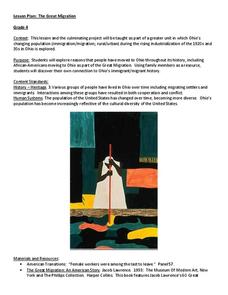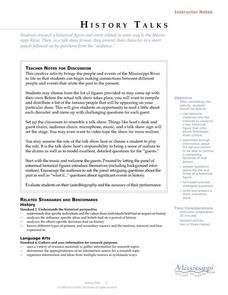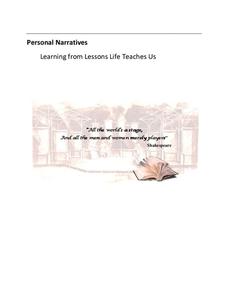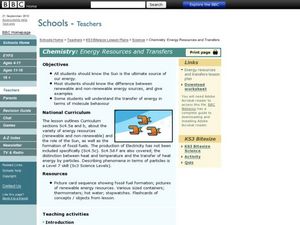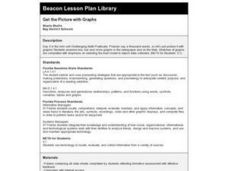Constitutional Rights Foundation
Conducting a Panel Discussion and Civil Conversation
The final lesson in an 11-session study of immigration asks class members to engage in either a panel discussion or a civil conversation of the controversial legal and policy issues they have investigated as part of the unit.
Constitutional Rights Foundation
Special Order 40
The city of Los Angeles' 1979 Special Order 40 states: "LAPD officers shall not initiate police action with the objective of discovering the alien status of a person." After reading a fact sheet that details the history of Special Order...
Newspaper in Education
The Iliad: A Young Reader Adventure
Is The Iliad part of your curriculum? Check out a resource that offers something for those new to teaching the classic and those with lots of experience using Homer's epic. Plot summaries, discussion questions, activities abound in this...
Curated OER
Group Discussion
Students participate in group discussion to problem solve. In this group discussion lesson, students exchange information, opinions and ideas in one of several types of discussion formats. Lesson format works for different...
Curated OER
The Great Migration
What a terrific instructional activity! Have your class learn about immigration using this resource. Fourth graders discuss the Great Migration in Ohio through art, writing, and discussion. Afterward, they create a presentation in which...
School Science
The Big Bang Time Machine
Scholars take off on an interactive spaceship to explore a historical timeline of the big bang theory. They learn about the evolution of mammals and humans, the formation of stars and planets, and the chemical composition of the early...
Curated OER
Current Issues Lesson 4: Local Police and Immigration Law: The Case of Special Order 40
Students examine immigration issues. In this immigration lesson, students prepare for a panel discussion regarding Special Order 40 in Los Angeles as they read an article regarding the order and role play local lobbyists in the panel...
Curated OER
Reparations for Slavery
Students analyze slavery reparations. In this American history lesson, students examine the pros and cons of paying reparations for slavery and participate in a discussion.
National Center for Case Study Teaching in Science
To Boldly Go, or Not
Here is a different way to combine social studies and science. Have your high schoolers read a passage about the 2004 vision for space exploration and then discuss the practicality, costs, and reasons for returning to the moon. Then, the...
Curated OER
Heeeeeere's Pea O'Vee!
Fourth graders assume the roles of characters in familiar fairy tales and participate in a panel discussion using a talk show format.
Curated OER
Comic Book Project
Learners write a fictional story into a comic book format. In this creative writing lesson, students analyze example comics and discuss the format. Learners create a comic book using imaginary characters that find a solution to a problem.
Curated OER
History Talks
Students engage in a lesson that deals with a historical figure from the area of Mississippi. Then questions are asked of them using a game show format that is followed with additional ones used for brainstorming for more ideas of inquiry.
Thoughtful Education Press
Personal Narratives: Learning from Lessons Life Teaches Us
"First Appearance," Mark Twain's tale about overcoming stage fright, serves as a model of a personal narrative and gets young writers thinking about milestones in their own lives. After examining student models and considering the...
Curated OER
Wheel of...Geology!
Students participate in a group review activity in order to prepare for an exam. Students study together in their teams prior to the review activity. During the game, the teacher spins a wheel with subject categories written on it and...
Curated OER
Chemistry: Energy Resources and Transfers
Students explore the concepts of energy resources and energy transfers. In this chemistry instructional activity, students examine renewable and non-renewable energy sources as they view classroom demonstrations and discuss the concepts...
Curated OER
Looking At Water: a Walking Field Trip
Fourth graders observe the effects of water on the soil and record those effect by drawing sketches of water erosion and conservation practices.
Curated OER
Drop in the Bucket
Students study the sources for the water they use. They determine their town's major water supply and how many gallons per day does the population use.
Curated OER
World Population Activity I: Excel
Students use Excel to explore population dynamics using the Logistic equation for (S-shaped) population growth. This activity is primarily intended as an introductory tutorial on using Excel.
Curated OER
News Coverage
Students compare and contrast methods of media coverage. In this media awareness lesson, students keep track of news regarding a world or national issue for the period of 1 week. Students collaborate to describe the type of coverage...
Cornell University
Making a Battery
Don't be shocked when your class has a blast making their own batteries! Science scholars examine a dry cell battery, then design and construct a wet cell battery. The activity guides them through the parts of a battery, the variables...
Curated OER
Chicago's Amazing Growth
Students, in groups, collaboratively explore the rapid growth of Chicago (from 350 to 300,000 in less than 40 years), and how the city changed to accommodate such rapid growth.
Curated OER
Article 9 of the Japanese Constitution
Students examine the historical background of Article 9 of the Japanese Constitution, analyze the role of defense in our world today, and evaluate the repercussions of Article 9.
Curated OER
Rising and Falling Fractions
Students explore outcomes from the conversion of fractions to decimals in stock market quotes and explore fluctuating interest rates using an amortization calculator.
Curated OER
Get the Picture with Graphs
Fifth graders examine line, bar and circle graphs in the newspaper and on the Internet. They complete sketches of graphs with an emphasis on selecting the best model to depict the data collected.






